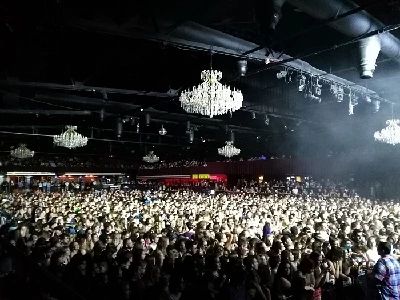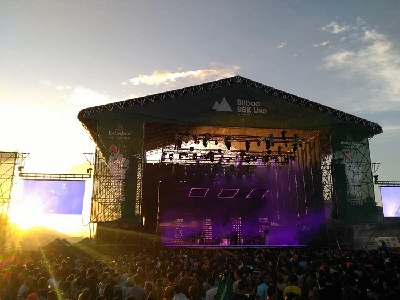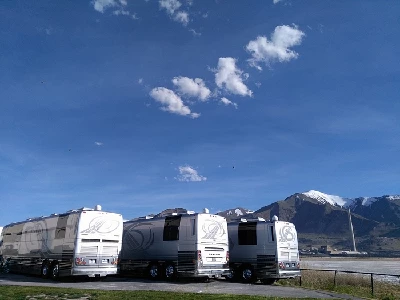published: 7 /
4 /
2021

Last April Cila Warncke for an article at Pennyblackmusic spoke to several people who worked in production and behind the scenes in music about the devastating impact that the Coronavirus crisis was starting to have on them. A year on she revisits them and others in the same situation to find out where they are now.
Article
"When COVID-19 mushroomed into a global pandemic, production work disappeared almost overnight. It is impossible to predict when it might return, or grasp the full repercussions for crews, artists, venues or fans. This article attempts neither to summarise nor forecast, but to reflect on the early days of this crisis in the hope we can look back on it from a better place."
-excerpt from 'Production Crew Confront Coronavirus',, Pennyblackmusic, April 2020.
2021
London: 11 February, 10:30AM
Matt ‘Tag’ Tagliaferro adjusts his Airpods. Wet snow clings to the pavements outside his north London home. It is three degrees Celsius above freezing. “With these, I can get something done while I’m on the phone,” he says. “My screen time is way up this past year.”
Memphis, Tennessee: 5 March, 11:00AM
“It felt good to have a break for a minute, but that got old.” Matt Brown gets up to refill his blue ceramic mug, and clears his throat. Later, he’ll strap on a parachute, grab a camera and follow tandem jumpers out of a plane, trying to hold the student’s awed face in frame as gravity hauls them all down.
London: 8 March, 10:00AM
The phone screen shows him smiling, an old WhatsApp profile picture. “January was particularly hard,” Will Paterson says. “There was no sign of a return. Even the most motivated people had hard moments.”
Phoenix, Arizona: 13 March, 5:50AM
The paper Holiday Inn coffee cups are stamped: “Start Fresh”. Chris Hall is trying. In half an hour, he’ll walk into the hotel conference room for the final written exams in his truck-driver training course.
There are two things that all these people have in common:
They used to work in live music production.
They never expected to be where they are now.
A year ago, we daydreamed that Covid-19 would vanish with the summer sun. What vanished instead was hope of a quick fix. Optimism became synonymous with magical thinking. The industry shutdown persisted like tinnitus.
According to trade publication Pollstar, the live music industry lost $30 billion of revenue in 2020. In Britain, some 10,000 people worked in music production, says Andy Lenthall, general manager of trade body the Production Services Association. In the United States, there were millions of such jobs. In the UK, the US and around the globe, most production workers lost their livelihoods.
The Lows
“When it first happened, I felt numb, panicked. I watched the news all the time.” Nevertheless, Brighton-based publicist Nikki McNeill told her clients, which include Serbia’s Exit Festival, the Amsterdam Dance Event, Secret Solstice in Iceland and the Netherlands’ Lowlands Festival, that she would keep working with them, budget or no.
After the initial blow, ripples of Covid distortion kept spreading. “So much of life has changed,” Will Paterson, head of sales for several London music venues, reflects. “Nobody would have thought we’d curtail our lives the way we have.”
Tagliaferro, erstwhile touring guitar tech, and his partner split up, “a Covid casualty, I guess. Audio technician Matt Brown says: “The biggest challenge is boredom. I’m still learning to write code, trying to stay busy.”
Another audio tech (and my partner), Chris Hall has put in his share of 200,000-mile travel years. Suddenly, the world shrank to the distance to the nearest grocery store. Mundane tasks became big deals. His neck and back locked up in the winter chill.
“Some people found purpose in spending time with their partners and kids,” Lenthall says. “But being at home is a problem for people who aren’t used to being at home. There are a lot of single people in the business, a lot of people who are always on tour. Their flat is where they repack their suitcase.”
A Different Beat
Odd pockets of production work still exist: Brown kept his job at local church which started streaming its services.
Photographer Andy Cotterill has spent more than two decades shooting music royalty. His portfolio runs from Public Enemy and Lee ‘Scratch’ Perry to Jarvis Cocker and Vivienne Westwood. Yet surviving Covid required other skills: “I was a top-grade student in woodworking at school so I did a few projects. People loved it. Someone asked me to do their kitchen, then a loft conversion. Before, if I’d done something else, I’d have felt like I failed at photography. I don’t think like that any more.”
Tagliaferro carried on fixing guitars. People who had guitars but never played them wanted them strung and tuned, bands stuck in London who’d started making new music, musicians whose prized instruments were in warehouses or shipping containers dug out beaters for an overhaul. “North London seemed to have a musical renaissance,” he says. “People wanted to do something productive and creative. It got to a point I couldn’t do it in my kitchen, so I rented a little space, built a few workbenches and fell into business, much like I fell into [touring] 15 years ago.”
This can-do, will-do attitude is characteristic. “You don’t want touring crew on the job market,” says Lenthall. “They are tenacious, hard working, they will get the job before you.”
Delivery and logistics have absorbed a lot of bodies. “I’ve had groceries delivered by a lighting guy I know,” Lenthall remarks. “We have world-class production managers coordinating vaccination centres. [Telecom company] Openreach has production crew tackling its fibre optic installation backlog.”
Paterson has spent the past year overhauling everything from venue websites to internal communications to plumbing. “It has been a split,” he says. “Those who’ve had stuff to do – well, work helps. People who couldn’t work, like the operations staff, have done all sorts of things that have nothing to do with music, just to give themselves a purpose.”
Patchy Safety Nets
Many cannot step into new roles, though, whether for health or other reasons, and driving a delivery van doesn’t come close to replacing tour wages. Government support has not been universally sufficient or effective. “Through multiple technicalities, I don’t qualify for anything,” says Tagliaferro. “I’ve never heard the phrase, ‘sorry, you fall through the cracks’ so often.” He reckons half the industry people he knows don’t qualify for assistance.
Perhaps not coincidentally, Paterson says half the people he knows have left music.
In the US, aid is on a state-by-state basis. Brown got a small grant, about enough to cover three months’ rent in his neighbourhood. He was on unemployment, briefly, until Tennessee reinstated a work-search requirement, with no exceptions for those whose industry had vanished. “What was I going to do? Work at the supermarket? Those jobs were already taken.”
Like so much related to Covid, a lot came down to chance. “I was lucky. The way my company is set up meant I qualified for government grants,” says McNeill. “I have friends who do the same thing but are excluded [from help] because of how they set up their business. It’s hard.”
Mourning the Lost
For all the “we’re in this together” rhetoric, Covid’s effects are unequal. “I’ve been impressed by my friends’ and colleagues’ abilities to pivot and start new ventures,” says Tagliaferro. “On the other hand, there have been lives lost to Covid, to suicide. It takes a special type of person to work in [production]. Being taken away from it has done serious damage.”
“A sense of purpose is woven into work, whether you’re a journalist, a photographer, a crew member,” says Lenthall. “That’s been taken away. That sense of belonging.”
Lives and livelihoods are the hardest loss. Other losses amplify these catastrophes and shadow recovery prospects. One of Brown’s favourite Memphis clubs closed down, one among the “hundreds” Rolling Stone reports have shut for good. Billboard is tracking closures on an ever-updating page.
At whatever point gatherings begin, these closures will reverberate: fewer places for bands to play, smaller tours, fewer crew, less money flowing into bars, restaurants, hotels and transport.
Braving a New World
Living with the pandemic has taught the dangers of prognosticating. Asked what ‘business as usual’ might look like in the future, Paterson will only say, “it won’t look the same.”
Brown foresees the consequences of production workers leaving the industry: “If there is a shortage of labour, you have a flood of new people willing to work for less. Suddenly, they don’t have to pay a veteran.” Lenthall concurs, “There is a fear right from the top, from bands, agents, promoters, that everybody is going to have to take a cut, because everybody has lost a lot of money.”
For Tagliaferro, touring makes sense on the right terms. “If you have two years of guaranteed day rate – as long as you don’t get fired – it’s pretty good.”
There are other considerations: “As a truck driver, I’m employed, have set hours, a salary and benefits,” says Hall. “If I went back to audio, I’d have to update my tools, buy new gear, go back to being self-employed with no benefits. It’s a risk.”
Though he would miss the work and camaraderie of touring, Hall shares the concerns over trends in wages and working conditions. Day rates for audio, he notes, haven’t changed much since he was 16. It might be time to move on.
“Lockdown has made people look at the things they might be good at, or things they might have done,” Cotterill says. “I was clinging to an identity [as a photographer] and didn’t want to feel like a failure. But it was stressful. If you’re earning a few hundred quid a month as a freelancer, you’re not surviving and you’re not happy.”
Wishin’ and Hopin’
“The balance between faith and hope is tipping more to the hope side,” Lenthall says when asked about the production industry’s current mood.
Brown’s best-case scenario is “we start doing big concerts in the fall. And I make some money. Likely scenario? There will be some concerts this fall: small bands, small clubs.”
“My hope is that people are able to get their jobs back and livelihoods stabilised,” Paterson says. “I hope employers continue to allow some remote working and support greater integration of physical wellbeing into the world of work.”
“Although lots of us are suffering, we’ve come together,” says McNeill. “People are supporting each other and campaigning. Everybody learning about each other’s businesses, how much things cost, what people’s jobs are – that will help us in the future.”
“We have to think we’re in for another year like the one we had,” says Tagliaferro. “We have to use what we learned last year to deal with this one.”
“I’m trying to be optimistic, trying help people when I can,” Cotterill says. “We’ve got to be more human. This doesn’t have to be a complete negative.”
Picture Gallery:-

